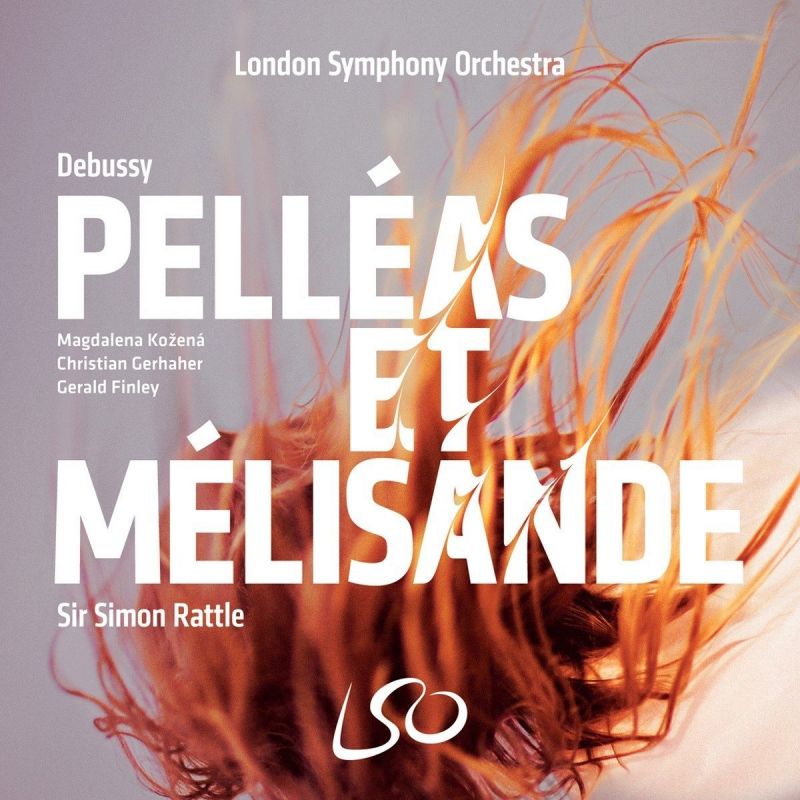DEBUSSY Pelléas et Mélisande (Rattle)
View record and artist detailsRecord and Artist Details
Composer or Director: Claude Debussy
Genre:
Opera
Label: LSO Live
Magazine Review Date: 12/2017
Media Format: Blu-ray
Media Runtime: 166
Mastering:
DDD
Catalogue Number: LSO0790

Tracks:
| Composition | Artist Credit |
|---|---|
| Pelléas et Mélisande |
Claude Debussy, Composer
Bernarda Fink, Genevieve, Mezzo soprano Christian Gerhaher, Pelléas, Baritone Claude Debussy, Composer Elias Mädler, Yniold, Treble/boy soprano Franz-Josef Selig, Arkel, Bass Gerald Finley, Golaud, Baritone Joshua Bloom, Doctor; Shepherd, Bass London Symphony Chorus London Symphony Orchestra Magdalena Kozená, Mélisande, Mezzo soprano Simon Rattle, Conductor |
Author: Mike Ashman
This is a takeover from Berlin of a Peter Sellars platform staging of Debussy’s opera. Sellars’s directing of the cast (identical in London to Berlin) has sorted out clearly motivation and mood. It has also, by virtue of his stage layout’s resiting of parts of the orchestra, brought new focus to the dramatic intentions of Debussy’s scoring (listen especially to the heartbeat timpani’s contributions).
Rather like the opera’s potential audience, conductors of Pelléas tend to divide into fanatics or absentees. Previous performances have clearly identified Rattle as one of the former. He negotiates a fine balance between the score’s intentional moments of stasis – often moments of the richest orchestral imagination – and the drama of a story whose characters’ continual refusal to see or face realities justifies Sellars’s allusions to an Alfred Hitchcock film. (In Act 4, remember, just before his death, Pelléas is still saying that he cannot see anyone when an evidently hostile Golaud is right behind him and Mélisande.)
Rattle maintains both a clear pulse in individual scenes and a through line which positively celebrates Debussy’s and Maeterlinck’s radical intercutting of scenes of varied physical and emotional locations in the central acts. He uses a broad and detailed orchestral palette but, again, the balance is very well made between the score’s wide range of dynamics – nicely observed too by Ernest Ansermet on his early and not to be ignored Decca recording – and unnecessary Romantic weight, an indulgence which Karajan (Warner), who often seems to be treading a similar path to Rattle, does not avoid. The obvious influence of Parsifal on the interludes is clearly felt but not laboured. Rattle’s tempos are also attentive to the natural pace and rhythm of conversation rather than throwing up abstract musical climaxes on their own. The LSO’s playing throughout is at a high level of virtuosity – try, for example, the fast-moving accompaniment to Golaud’s pulling Mélisande around by the hair in Act 4 scene 2.
Aside from the Montreal-born Gerald Finley there are no natural French speakers in the cast – but don’t worry. The language side, an annoying glitch on some rival recordings, has been fully taken care of. The French of the German Pelléas and Arkel is especially well studied. Both Gerhaher and Kožená are good at not over-egging the pudding of their confusions and naiveties, or indeed flirtatiousness, which fixes even more attention on the words. Finley manages to make Golaud’s rages frightening without the ‘evil’ melodrama that bigger, darker voices have brought to the role. And the older generation are clearly – and again, simply – focused on what they are saying, Selig’s Arkel moving in his defence of the dying Mélisande in Act 5.
Pelléas has been lucky on disc. Aside from the first Ansermet – which has a sense of wonder when every page is turned – there is the famous old Désormière, an impeccable if slightly cool mainline version in inevitably dated sound. Irresistible – and distinctly different in approach – are the Haitink/French Radio version (beautiful conducting, very sad and perhaps his finest opera recording to date) and Pierre Boulez, the dedicatee of the present recording. The latter is remarkable for a no-nonsense black-and-white statement of the notes which makes the score sound even more contemporary than it was.
If we are talking competition, this new version (which, as I have already hinted, sounds exceptionally clean and fine) scores high up the list and is highly recommended – an early jewel in the crown of Simon Rattle’s assumption of the principal conductorship of the LSO.
Discover the world's largest classical music catalogue with Presto Music.

Gramophone Digital Club
- Digital Edition
- Digital Archive
- Reviews Database
- Full website access
From £8.75 / month
Subscribe
Gramophone Full Club
- Print Edition
- Digital Edition
- Digital Archive
- Reviews Database
- Full website access
From £11.00 / month
Subscribe
If you are a library, university or other organisation that would be interested in an institutional subscription to Gramophone please click here for further information.




